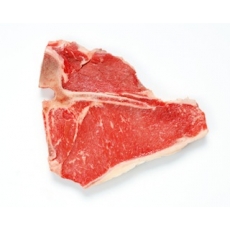Brands
Does Red Meat Clog Your Arteries After All?
Written BY: MARK SISSON
I’ve been asked to comment on the latest media deluge to suggest that red meat is again the primary cause of atherosclerosis, heart disease, and your impending doom. At least this time they’re targeting something other than cholesterol: this time it’s carnitine.
Carnitine is found in red meat, mostly, as well as dairy, tempeh, and some other meats, and it performs a number of important roles in the human body, foremost of which is the transportation of fatty acids into the mitochondria for breakdown into useable energy. It’s so important to basic function that we make endogenous carnitine by synthesizing it from the amino acids lysine and methionine. Vegans and vegetarians, who tend to run deficient in carnitine, benefit greatly from supplementation (or a nice steak). It’s even been used to reduce atherosclerosis (albeit in rabbits), improve arterial function, and help heart failure patients recover. Carnitine is not some evil compound.
Oh, the study. Let’s get into it. It consisted of several sections, actually.
First, they fed humans eight ounce steaks (amounting to roughly 180 mg carnitine) with a side of 250 mg carnitine tabs. Omnivores showed increased blood and urine levels of Trimethylamine oxide (TMAO), a compound associated with cardiovascular disease, while vegetarians and vegans (who were somehow able to get the steak down) showed far lower levels of TMAO in their blood and urine.
Next, they tested what was producing the TMAO by administering antibiotics. Eliminating gut flora populations with antibiotics also eliminated the food-induced increase in TMAO, showing that the intestinal microbiota were metabolizing carnitine into TMAO. After allowing the subjects’ guts to repopulate, they ate more steak. The increase in TMAO after eating steak reappeared, confirming that gut flora metabolism of carnitine was responsible. Subjects with higher levels of Prevotella bacteria in their guts saw the biggest increases in TMAO.
(As it turns out, gut flora convert carnitine to TMA, which the liver then converts to TMAO using a hepatic enzyme called FMO3, but it’s easier to just say carnitine converts to TMAO.)
They also tested ApoE-deficient mice and got similar results. Feeding mice carnitine increased TMAO levels in serum and doubled arterial plaque formation over control, while giving antibiotics abolished this effect. So, in a certain strain of mice, dietary carnitine increases TMAO levels, which accelerates atherosclerosis. If you recall from this week’s Dear Mark, ApoE status is strongly associated with cardiovascular disease risk, and these mice were totally deficient in it. They were bred to be extremely sensitive to atherosclerosis in order to facilitate research. It’s a common and useful tool – it’s not like they’re trying to pull a fast one – but we should be aware of it.
They also examined how TMAO increases atherosclerosis in mice: by reducing reverse cholesterol transport. In other words, it impaired the mouse’s ability to remove cholesterol from the arterial wall without decreasing cholesterol uptake or synthesis to the same degree, creating a net surplus of cholesterol in the wall and speeding up atherosclerosis.
Now, before you unplug your chest freezer full of grass-fed beef and start buying wheat futures, keep reading.
The initial association between TMAO and cardiovascular disease in humans is just that – an association. Causation is not established, and it may even be that cardiovascular disease or some other common event increases TMAO as a response to injury or disease. An increase in serum TMAO is, for example, a marker of certain kidney injuries (PDF). It could merely be correlation or even reverse causation. We simply don’t know.
We don’t know if the experimental results in rodents apply to humans. Sure, the omnivorous people who ate steak and took supplements saw an increase in serum TMAO, but atherosclerosis was not measured. The same mechanisms that affect ApoE-deficient mice may not apply to humans.
It was the gut flora, not the carnitine. While subjects who typically ate meat saw the biggest increases in TMAO – which the researchers saw as evidence of the gut flora adapting to the host diet – and were characterized as having Prevotella-dominant guts, most evidence suggests that Prevotella bacteria are associated with carbohydrate-rich diets. That said, accumulating evidencesuggests that the hundreds of species living in our guts can’t be quite so easily and neatly cataloged or categorized.
You know what else raises TMAO? Fish. That’s right – heart attack-inducing, artery-clogging, linked-to-every-disease-state-known-to-man fish actually contains TMA, the metabolite that converts to TMAO in the body. TMA is what gives fish the “fishy smell,” and when people eat fish, urine TMAO increases. Strangely, the latest research shows that fish is consistently associated with better cardiovascular health, not worse (despite the TMA content and effect on TMAO levels).
FMO3, which as you’ll recall from the parenthetical above is responsible for the conversion of TMA to TMAO, does things other than produce heart disease. It is also involved in the metabolism of selenium (an important cardioprotective, thyroid-protective, and cancer-protective nutrient).
TMAO itself may not be “all bad.” It’s an osmolyte – a protein stabilizer. It’s even been used to prevent cataract formation in mammalian eye lenses.
Choline, another important nutrient found in eggs, meat, dairy, and offal with a similar structure to carnitine, was shown a couple years ago to convert to TMAO after exposure to certain types of gut flora, causing researchers to suggest it too promotes atherosclerosis (see Chris Masterjohn’s take on it). And yet eggs have been vindicated over and over again for their beneficial or neutral effects on heart health, including the most recent one I mentioned this past Sunday.
It’s complicated, in other words.
That’s not to discredit the results of this latest study; sufficient amounts of TMAO do appear to accelerate atherosclerosis in rodents. Impaired reverse cholesterol transport, which TMAO produces (again, in rodents), probably accelerates atherosclerosis regardless of species, all else being equal. We should definitely keep an eye on this and any other future research. I’m particularly interested in what this means for research into the effects of gut flora on human health.
Ultimately, this admittedly interesting research is all very preliminary. Rodents bred to be especially sensitive to cardiovascular disease (ApoE-knockouts) develop atherosclerosis at twice the normal rate when exposed to TMAO in the diet and/or serum. That’s all that they’ve established. Humans with the right (wrong?) gut flora composition also generate serum TMAO in response to dietary carnitine, but increased atherosclerosis has not been shown. And, contrary to their assumptions, a relationship between red meat (not processed meat) and cardiovascular disease has not been established in the literature. Quite the contrary: recent epidemiological evidence seems to exonerate the fresher, redder stuff.
If anything, this serves to underline (not undermine) the basic gist of the Primal eating philosophy. Eat a variety of foods. Don’t just eat steak. Eat fish, and eggs, and chicken liver, and pork chops. Don’t just eat meat. Eat vegetables. Eat probiotic-rich foods (probiotics have already been used to lower TMAO levels, while kimchi consumption was said to account for the inter-individual differences in TMAO production in another study). Eat prebiotic-rich foods, so as to provide food for your gut and diversify the population.
That last bit is key. We have to realize that it’s the gut flora modulating the effects of carnitine and TMAO – not the carnitine (or red meat) itself. It may be that we Primal eaters (as if you could categorize us so easily) have the absolute worst kind of gut flora, the kind that produces TMA by the truckload to be carted off to the liver for conversion into TMAO, and we’re about to start dropping off like flies. But I doubt it. I think the way we eat is more likely to diversify our guts and give us a floral profile associated with better health, rather than worse. But we’ll see. We still have a lot to learn about what lurks – and lives – inside us.
I’m sure you’ll be inundated with other writers giving their thoughts today and in the near future, but these are my initial ones. Hope it helps!
Read more: http://www.marksdailyapple.com/does-red-meat-clog-your-arteries-after-all/#ixzz2Q6C6wV2G
Write a comment
Your Name:Your Comment: Note: HTML is not translated!
Enter the code in the box below:

Mortons Fine Foods © 2025











